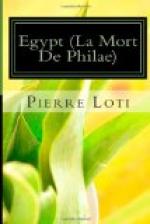The road ends, opening on to darkness. Suddenly, without any warning, it abuts upon a void in which the eyes see nothing, and we roll over a yielding, felted soil, where all noise abruptly ceases—it is the desert! . . . Not a vague, nondescript stretch of country such as in the outskirts of our towns, not one of the solitudes of Europe, but the threshold of the vast desolations of Arabia. The desert; and, even if we had not known that it was awaiting us, we should have recognised it by the indescribable quality of harshness and uniqueness which, in spite of the darkness, cannot be mistaken.
But the night after all is not so black. It only seemed so, at the first moment, by contrast with the glaring illumination of the street. In reality it is transparent and blue. A half-moon, high up in the heavens, and veiled by a diaphanous mist, shines gently, and as it is an Egyptian moon, more subtle than ours, it leaves to things a little of their colour. We can see now, as well as feel, this desert, which has opened and imposed its silence upon us. Before us is the paleness of its sands and the reddish-brown of its dead rocks. Verily, in no country but Egypt are there such rapid surprises: to issue from a street flanked by shops and stalls and, without transition, to find this! . . .
Our horses have, inevitably, to slacken speed as the wheels of our carriage sink into the sand. Around us still are some stray ramblers, who presently assume the air of ghosts, with their long black or white draperies, and noiseless tread. And then, not a soul; nothing but the sand and the moon.
But now almost at once, after the short intervening nothingness, we find ourselves in a new town; streets with little low houses, little cross-roads, little squares, all of them white, on whitened sands, beneath a white moon. . . . But there is no electricity in this town, no lights, and nobody is stirring; doors and windows are shut: no movement of any kind, and the silence, at first, is like that of the surrounding desert. It is a town in which the half-light of the moon, amongst so much vague whiteness, is diffused in such a way that it seems to come from all sides at once and things cast no shadows which might give them definiteness; a town where the soil is so yielding that our progress is weakened and retarded, as in dreams. It seems unreal; and, in penetrating farther into it, a sense of fear comes over you that can neither be dismissed nor defined.
For assuredly this is no ordinary town. . . . And yet the houses, with their windows barred like those of a harem, are in no way singular—except that they are shut and silent. It is all this whiteness, perhaps, which freezes us. And then, too, the silence is not, in fact, like that of the desert, which did at least seem natural, inasmuch as there was nothing there; here, on the contrary, there is a sense of innumerable presences, which shrink away as you pass but nevertheless continue to watch




